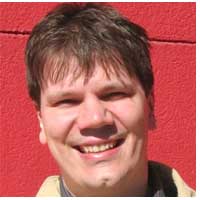Workshop on QUANTUM INFORMATION PROCESSING AND QUANTUM COMMUNICATIONS
Quantum Information Processing and Quantum Communications
Using Orthogonal Arrays in Quantum Computing
>VITAE: Martin Roetteler received the Ph.D. degree in computer science from the University of Karlsruhe, Germany, in 2001. From 2000-2002 he has been working on the IST project Q-ACTA coordinated by Thomas Beth (Karlsruhe) and funded by the European Commission. During September 2002, Martin was a general member of the Quantum Computation program at the MSRI, Berkeley. Since January 2003 he is a post-doctoral fellow with the Department of Combinatorics and Optimization and the Institute for Quantum Computing, University of Waterloo, Canada. His research interests include quantum algorithms, quantum error-correcting codes, and representation theory.

• Along the way I will also discuss basic properties of unitary error bases.
They are instrumental for quantum error-correcting codes and the design of teleportation and super-dense coding schemes. Two constructions of such bases are known: an algebraic construction due to M. Knill using projective representations of finite groups and a combinatorial construction due to R. Werner using Latin squares and Hadamard matrices.
• Orthogonal arrays can be applied to solve another problem in quantum information theory which became popular under the name “Mean King's problem”. Here elementary combinatorics of affine planes can be used to prove an extension of a paradox due to Vaidman-Aharonov-Albert to systems of prime-power dimension. Mutually unbiased bases feature prominently in this problem and will be revisited briefly.